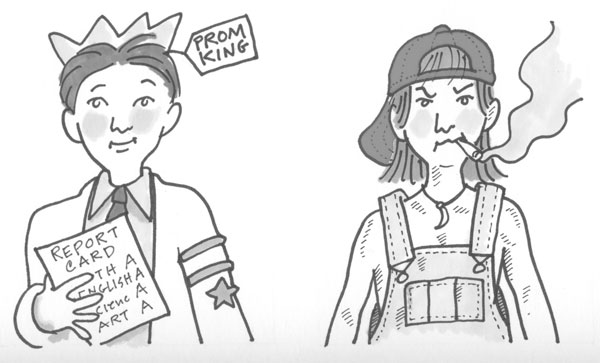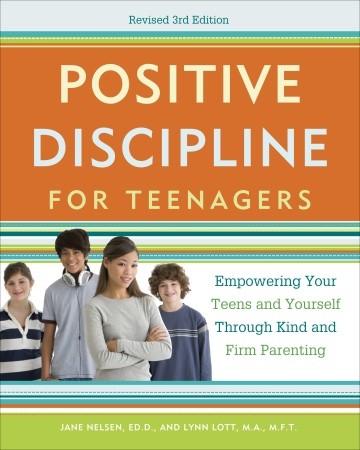The following is an excerpt from the book, Positive Discipline for Teenagers by Jane Nelsen and Lynn Lott.
You know you have a teenager when you hear yourself complaining, “She has no purpose. He won‘t help. She only cares about her friends. He is so self-centered. Her room is a mess. I can‘t trust him. This is out of control. I can‘t stand her hair, clothes, makeup, or music. He wastes his money. She resents me and idolizes rock stars. We fight about screen time constantly because my teen is always on his phone.”
Another sign that you have an adolescent is when you hear him complaining, “My parents treat me like a kid. They think I‘m having sex all the time. They butt in. They hate my friends. They give advice. They try to live my life for me. They are never satisfied. All they do is ask questions and control my life. Why can‘t they just leave me alone?”
The Dream Teen and the Normal Teen
IN OUR WORKSHOP on parenting teenagers, we asked one group to draw a “normal” teen, or how most parents see their teens. The composite teen was messy and self-centered, listened to loud music, defied authority, preferred friends to family, decorated room with posters, valued cars and an independent lifestyle, conformed to the clothing styles of peers (no matter how gross), smoked, and drank alcohol. Comments from the group included:
- “Well this is an exaggeration. All teens aren‘t like this.”
- “But, it sure does depict the rebelliousness because most of them are a lot like this.”
- “It helps to be reminded that my teen would not be normal if he cleaned his room.”
- “Come to think about it, I was like that once.”
The last comment was a nice reminder to the group that we all continue to grow and change beyond adolescence.
Another group was asked to draw a “dream” teen, or how most parents think they want their teens to be. The composite teen was voted prom queen or king, kept agreements (“I promise to be there on time, as always.”), volunteered to help, loved to talk to parents (“Let me tell you everything about my life.”), ate only healthy food, didn‘t watch television, was very athletic, earned two scholarships (one athletic and one academic), scored high on the SATs, lined up a summer job by January, supplied his or her own money for hair or makeup and saved the rest for college and a car, respected everyone (including siblings), was respectfully assertive, and was an A student. Comments from the group included:
- “A teen like this wouldn‘t have any friends.”
- “No one could stand him.”
- “There is no such thing as a ‘dream teen’.”
- “My teen tries to be like this and she seems pretty stressed most of the time.”
This exercise reveals that although you may fantasize about having an ideal teen, you instinctively know that such a creature is rarely found. Even though the reality of living with a “normal” teen can be quite painful, it will be easier if you can come to a deeper understanding of what is happening during adolescence.
Someone once said that the teen years were created so parents would find it easier to let go when their children turned twenty. At times this statement seems like an understatement. Some teens can be very hard to love. They make promises that they forget to keep. They think they know everything and continually tell you how stupid you are. They hate to clean their rooms, they listen to music you can‘t stand, and they exaggerate everything. They even talk funny. Sometimes they talk so fast, only another teenager can understand what they‘re saying. Other teens seem to withdraw into a shell. They don’t put you down, they just clam up or revert to one-word sentences such as, “Yeah” or “Nah.” Occasionally you may hear three words, “I don‘t know.”
Often, parents look at their teens and feel a sense of failure. You may wonder how you could have created such a monster. You may wonder if there is any hope for one last chance to teach them lessons and to mold them into decent human beings. You may feel desperate and hopeless, angry and aggravated.
If you could simply relax and remember that these are the years when your children are experimenting in an attempt to find out what they think, you could enjoy them more. If you gave up trying to teach them and instead learned to be curious and amazed, you could appreciate their struggle. If you could relax, you could trust that who they are now is in no way a reflection on you or indicative of who they will be when they grow up. With these new attitudes, you could focus on long-range parenting and learn to be a guide and facilitator who your teen could trust.
Take a Trip Down Memory Lane
THINK BACK TO your teen years. Do you remember what your world was like? What were your issues? What did you think about all day? Take time to make a list of what was important to you. You might even want to talk to people who were teens during different decades (the 1990s, 1980s, 1970s, and so forth). Ask them what was important to them as teens, what they were like, and how they were parented. Compare your information with the following issues, mentioned by teens today:
TEEN ISSUES
- Am I going to get invited to the dance?
- What should I wear?
- How can I find time for studying?
- How can I be popular, or at least included?
- How can I get a car?
- What should I do about drinking, drugs, and sex?
- What is happening to my body?
- Will my breasts/penis be as big as the other kids?
- Will other kids think I‘m cool?
- How can I get my parents off my back?
- Should I go to college?
- What is there to do? (I‘m bored)
- What are other kids saying about me behind my back?
- How can I ever please my parents? (All they care about is grades and chores.)
Notice that these issues do not include anything about clean rooms, a clean house, doing chores, spending time with family, being considerate, or being nice to brothers and sisters. Parents often think that their teens are doing or not doing certain things because they want to hurt their parents or that their teens are being disrespectful of their wishes. As you can see from your list and the list above, teenagers usually aren‘t thinking much about their parents. Parents will be much happier if they accept and respect the fact that, for instance, chores are not a priority for teens. That doesn‘t mean they shouldn‘t do them. It does mean you‘ll have better results if you acknowledge to your children, “I can understand that chores aren‘t a priority for you, but they need to be done anyway. Let ‘s work on a plan to make chores as easy as possible.”
What Is Happening During Adolescence?
IF YOU THINK that how your children behave as teenagers is who they will be for the rest of their lives, you probably feel a fair amount of anxiety. Although it may seem otherwise, your teens have not grown up to be terrible people, because they are not grown up yet. They are individuating; their behavior is only temporary. It will last for as long as it takes for them to find out who they are and how they can move from childhood to adulthood.
Many life tasks are inherent in child growth and development. These tasks may be physical, intellectual, emotional, social, psychological, or spiritual. As young people move through adolescence, from childhood to adulthood, their primary task is individuation.
CHARACTERISTICS OF INDIVIDUATION
- Adolescents have a need to find out who they are.
- Individuation usually looks like rebellion to parents.
- Adolescents go through huge physical and emotional changes.
- Peer relationships take precedence over family relationships.
- Teens explore and exercise personal power and autonomy.
- Teens have a great need for privacy.
- Parents become an embarrassment to their teens.
- Teens see themselves as omnipotent and all knowing.
Adolescents Have a Need to Find Out Who They Are
Teens want to know how they are different from their families, how they feel and what they think about things, and what their own values are. This process of separation from the family in preparation for an independent adulthood is called individuation.
Individuation Usually Looks Like Rebellion to Parents
Although most parents worry when their teenagers rebel, it would be more appropriate to worry if they didn‘t. Teenagers must begin their separation from their families, and rebellion gives them the ability to do this. At first, teens may rebel by challenging what is important to their families (family values) or zeroing in on what their parents want and then doing exactly the opposite. Later, they may rebel in other ways—but at first individuation is primarily a reaction against their parents, and doing the opposite is the simplest, most natural way of being different. If teens are not allowed to rebel, they may do it in their twenties, thirties, or fifties. Even worse, they may become approval junkies— afraid to take risks or to feel comfortable with who they are.
Adolescents Go Through Huge Physical and Emotional Changes
Whether they like it or not, adolescents are maturing physically and sexually, undergoing biological processes that are essentially out of their control. In addition to the tumultuous, contradictory feelings these major changes cause, adolescents may feel anxiety regarding their rate of change—they may feel their physical maturation is too quick or too slow in relation to that of their peers. (Most parents would prefer their children to mature slowly, but nature has its own patterns.)
The physical maturation process, with its sudden and powerful hormonal changes, causes mood swings. Without premeditation, teens are delightful one minute and biting your head off the next. In addition, some teens are in such a rapid rate of physical growth that they experience real “growing pains,” where their bodies actually hurt.
Peer Relationships Take Precedence Over Family Relationships
Teens need to work out their relationships with peers to find out if and how they fit in. Friendships take the place of time spent with family. Although peer relationships help teens in their task of separation, parents often interpret it as rejection or rebellion. Have patience. If you avoid power struggles and criticism, your teen will become one of your best friends in his or her twenties.
Teens Explore and Exercise Personal Power and Autonomy
Teens have a strong desire to find out what they are capable of—they need to test their power and importance in the world. This means that they want to decide what they can do for themselves without being directed and ordered. Parents often take this as a challenge to their own power, thus creating power struggles. Some teens find personal power so intimidating that they want others, usually their peers, to tell them what to do, which can be a dangerous consequence of overly controlling parents. This is not a very easy choice— rebellion or compliance—but it ‘s often the only choice teens see when they don‘t have the opportunity to exercise their own personal power and autonomy. For parents, the key is learning to support teen rebellion in respectful ways that teach important life skills, which is the focus of this book.
Teens Have a Great Need for Privacy
Because their rate of development moves so fast and is out of their control, it can be embarrassing for teens to have their families watching and knowing. As teens try to figure out what‘s important to them, they may engage in activities without parental approval before deciding for themselves that they might not want to do the activities after all. To escape getting in trouble or to avoid disappointing you, teens will figure out how to test activities that you may not approve of without your knowledge.
Your teen‘s need for privacy can be very scary for you. You may worry that you are not being a responsible parent if you don‘t know everything your teen is doing. You may fear that your teen might build bombs (or engage in some other disastrous activity) if you are not vigilant. We have news for you: If your teens are going to engage in these activities, they will do it in spite of your vigilance. They will just go underground so they have less chance of getting caught.
The best prevention for possible disaster is to build kind and firm relationships with your teens—let them know that they are unconditionally important to you and provide opportunities for them to learn important life skills. They will then be able to think for themselves and figure out what is important to them. Accomplishing this goal is the aim of this book.
Parents Become an Embarrassment to Their Teens
During the teenage years, teens tend to put their parents down and try to show parents how “stupid” they are. Sometimes teens act embarrassed around their parents and families in public or may even refuse to be seen with them. The affection that may have been a normal part of family life may suddenly become taboo. We will remind you many times that this is a temporary condition, unless you make an issue of it that builds resentment for the future.
Teens See Themselves as Omnipotent and All Knowing
Parents who try to tell teens how to dress or eat or what they can or can‘t do just don‘t seem to understand that teens never get sick, don‘t get cold, don‘t need sleep, and can live forever on junk food or no food at all. Many parents wonder how their children even survive these years, but the facts are that most teens do. To some it may seem that the methods we advocate are permissive and increase the chances of drastic consequences. The opposite is true.
Not Permissiveness
OFTEN, WE GET a very strong reaction from parents who read this list of teenage characteristics. The comments of these parents are very similar, “You can‘t just stop being a parent and let kids go off on their own to individuate.” That last word is said with a great deal of sarcasm.
We do not advocate permissiveness, because that kind of parenting deprives young people of the opportunities to learn life skills, to develop their own potential, to be self-reliant and responsible, and to learn from their mistakes. To do all of this, they need guidance (kind and firm parenting as described in chapter 3), but not external controls, which only increase rebellion. Throughout this book, we show you how to help guide your teens in new, positive ways.
Positive Discipline for Teenagers by Jane Nelsen and Lynn Lott




No Comments yet!